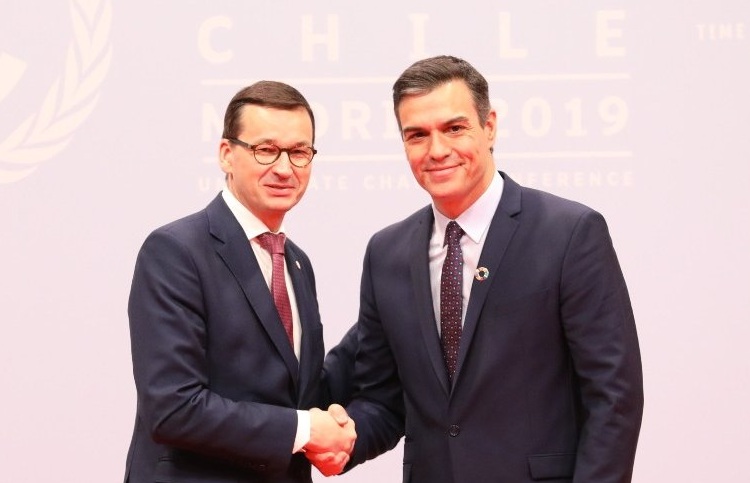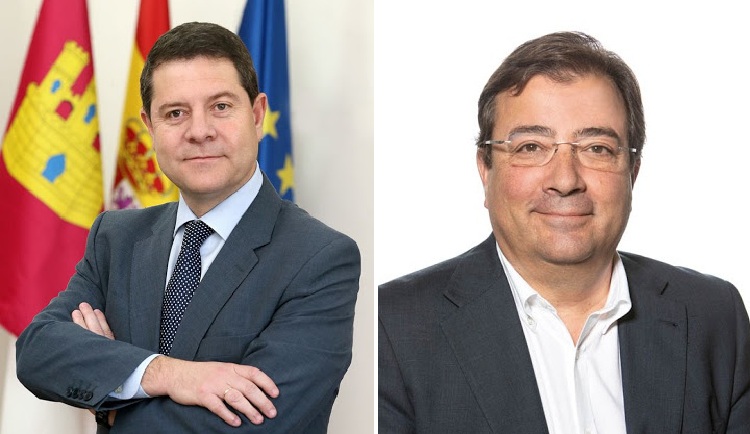Eduardo González
The town of Alcalá de Henares, in Madrid, will host today the XIII High Level Meeting between Spain and Poland, in which the two governments will address both the strong ties that unite them, especially in the economic and cultural fields, as well as their major discrepancies in European debates on migration and climate change.
The summit, the first since the one held in Warsaw in 2017, will be chaired by the two heads of government, Pedro Sánchez and Mateusz Morawiecki, and will be attended by almost half of the Executive and their corresponding Polish counterparts. Spain will be represented by the Second Vice-President for Economic Affairs, Nadia Calviño; the Third Vice-President for Labor, Yolanda Díaz; the Fourth Vice-President for Ecological Transition, Teresa Ribera; the Minister of Foreign Affairs, Arancha González Laya; the Minister of the Interior, Fernando Grande-Marlaska; the Minister of Transport, José Luis Ábalos; and the Minister of Industry, Trade and Tourism, Reyes Maroto.
During the meeting, according to government sources, six agreements will be signed in the Paraninfo of the University. On the one hand, the Minister of Foreign Affairs, Arancha González Laya, and her Polish counterpart, Zbigniew Rau (who already met last February 4 in Warsaw), will sign three Memorandums of Understanding on collaboration between Diplomatic Schools, on cybersecurity and on bilateral political consultations between general directors and exchange of diplomatic officials. In addition, they will sign a cooperation agreement on culture, education and science for the period 2021-2024, piloted by AECID.
Also during the High Level Meeting, a Memorandum of Understanding will be signed between the two Ministries of Transport for the joint development of transport infrastructure in Poland in the coming years and another Memorandum of Understanding between the two Ministries of Industry, which will include a declaration of intent on industrial collaboration at the technical level. The summit will conclude with the signing of a joint declaration, as is customary in this type of meeting.
According to the aforementioned sources, the meeting will be an opportunity to highlight the great ties between the two countries. Spain and Poland maintain solid trade relations, with a very balanced trade balance that in 2020 reached 11.6 billion euros in exchanges. In addition, numerous Spanish companies operate in the country, especially in sectors such as telecommunications and renewable energies. The two countries also maintain strong ties in cultural matters, with the presence of two Cervantes Institute centers (including the headquarters in Warsaw), and social, with an outstanding presence of Polish citizens in Spain. In fact, one of the reasons for choosing Alcalá de Henares as the seat of the RAN is the important Polish community that resides in this city, made up of around 1,400 people.
Discrepancies in the EU
In addition to these coincidences, there are currently major discrepancies between the two countries within the EU, not only in terms of rights and freedoms, but also in everything related to migration policy and climate change, two very important issues in the current European debate, which will also be addressed during the summit.
On the one hand, Poland, like other Eastern countries, has clearly stated its opposition to the imposition of compulsory quotas in the European mechanism for the distribution of migrants and refugees, as advocated by first border countries such as Spain, Italy, Greece, Malta or Cyprus. To defend its positions, Poland has repeatedly recalled that it is also a border country and that it also receives numerous migrants from Ukraine and even India. In addition, Warsaw is the headquarters of the European Border and Coast Guard Agency (FRONTEX).
On the other hand, the two countries also have strong differences on climate change, an issue on which Poland has shown a very tough position in recent European Councils and which Ribera will address with her Polish counterpart.
However, the waters have calmed down considerably on an issue that generated a lot of controversy at the end of last year, namely the Multiannual Financial Framework and the Recovery Fund following the COVID-19 crisis. Poland and Hungary – against whom proceedings have been opened for problems with the rule of law – had threatened to block the agreement on the EU budget in response to the decision of the EU Member States and the European Parliament to make the disbursement of the Recovery Fund conditional on the respect of the rule of law by the Member States.
Finally, European leaders approved last December an agreement between the German Presidency and the two governments guaranteeing that conditionality mechanisms related to respect for the rule of law would only be applied in an “impartial and non-discriminatory” manner and would not be used to put pressure on these two countries in other matters, such as migration policy, which made it possible to lift the veto of Hungary and Poland. Poland and Austria ratified last Thursday the decision on own resources, which will allow the European Commission to go to the financial markets to obtain 800,000 million euros and which, finally, has already been ratified by the 27 Member States.







